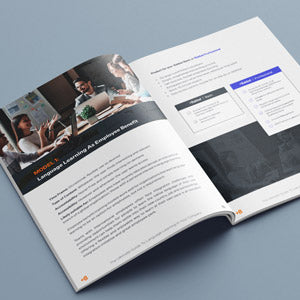One day for every working day
by Thea Bohn, Team Lead B2B Content
International Women’s Day is on March 8th – one day that is dedicated exclusively to women. And it’s every working day that women are on the job, delivering quality work, work that is all too often delivered within structures that work against women by inhibiting equal opportunity across genders.
Your very own B2B content team is formed by four professional women. That’s why we’ve already marked March 8th in our calendars and have been talking about it for several months already. A sort of nervous disbelief when re-reading research on equal opportunity in Germany sparked new conversations and, among other content, this article, in which we share our own perspectives as women.
My wish is simply that we bring awareness to the fact that women in corporate environments are usually highly aware of their gender at work. I, for one, am extremely grateful for being judged by my merits and working in a value-driven team. That feels like a huge win for me – but it should be the norm. Some days, I can laugh things off, like when external coworkers ask if “we girls can maybe include the decision-making guy”, not realizing that’s me – and I had just made the decision. On other days, I’m simply annoyed that creating equality in the workplace isn’t a to-do that we can deliver by the end of the week. What helps, then, is to get together, share stories, and foster understanding.
Within the next weeks, we hope to offer strategies of empowerment through language learning. We aim to enable clear communication around important topics so we may together endeavor to form the best performing teams possible – which, as should go without saying, includes offering women equal visibility and opportunity for their careers.
You’re too emotional
by Lea Naschberger, B2B Content Project Manager
The more languages you speak, the more stories you understand.
The more stories you understand, the more empathetic you become.
The more empathetic you are, the more likely it is that somebody will tell you, “You’re too emotional.” Especially if you’re a woman.
During my career, I was also told I was “too emotional“ by former (male) colleagues. Maybe it’s because I speak 5 languages and I, therefore, understand more stories and am extra empathetic, which could be seen as a strength. However it was not seen this way by these colleagues, who also pointed out not to take it personally, as it was only “feedback”.
Reflecting on your own habits and behavior is indeed beneficial for personal growth, however I started to question how beneficial this “feedback” was intended to be. Some time into my career, I realized that women all over the world in all sorts of positions are being told the exact same thing. Telling women they are “too emotional”, labelling them as “difficult”, “loud”, or “whiny”, begins to build an argument that women cannot control their feelings – the implication being that they should, therefore, not be offered a seat at the table.
After years of beating myself up for being “too emotional”, I learned that my empathy and sensitivity are some of my strongest and most important skills, when it comes to my career in content marketing. Not only do I understand my audience but also my colleagues and their needs. Growing up bilingually and learning additional languages has certainly always helped me understand people, their stories, and their points of view.
It seems that learning languages, as well as empathy, are less talked about leadership skills, but are now more relevant than ever. Therefore, if somebody told me again today that I was “too emotional”, nowadays, I would take it as a compliment.
Knowledge is power
by Marta Mariani, B2B Content Manager Italy
As the old saying goes, “Knowledge is power”. It’s an adage I’ve internalised and developed further in the context of language learning – if knowledge is power, then the knowledge of multiple languages gives you multiple powers!
I find this to be particularly true when I take a look at my own career and work experience. Growing up in a country (Italy), where the gender pay gap is far from close, where women have to work harder than their counterparts to reach certain milestones, I knew that language learning was the tool that would help me achieve my career goals and open doors to more opportunities. It was the asset that empowered me to step out of my comfort zone and leave an unfulfilling, and often demeaning, job in my country to pursue a more exciting one abroad.
I am happy that some years ago, confident in my language skills and ability to work in multilingual teams, I took the plunge and moved on. I now create content around language learning for the Italian market at Babbel. I hope the content I create serves to trigger a much needed discussion around topics, such as diversity, leadership opportunities for everyone, and gender equality in the workplace, in my own country.
Languages are Leadership Skills
by Lilly Miner, B2B Content Marketing Manager
On a personal level, I can say speaking various languages, fluently or partly, has opened many doors and has empowered me to apply for jobs and live and work in different countries, such as the United States, the Netherlands, Australia, Spain, and Germany. I speak German and English fluently, have learned French and Dutch, and am currently working on improving my Spanish skills. I’m far from being fluent, but I’m able to have small conversations and, more importantly, get a glimpse into another culture. Language learning quite literally has broadened my horizons, as cliche as that may sound. It has also helped me connect with colleagues from other parts of the world and form new friendships.
Working in an international team, I think one of the most important skills a leader can have is understanding people and having empathy for different perspectives. As Koontz & O’Donnell define it, leadership is what “molds individuals into a team”. In order to make a team work effectively, you need to understand the individuals first. I believe language learning supports intercultural competence and a better understanding of people. This fosters diversity in a team, which ultimately leads to more innovation and success.
According to Robbins, “the ultimate definition of leadership is empowering others to become effective leaders as well.” The more you understand the people in your team, the more you can find ways to empower them. This may be by inviting them to lead a project they are passionate about, by simply listening to their opinion, or through providing language training.
International Women’s Day is a great reminder to reflect on what has empowered us and how we can empower others, especially the women in our team. Languages are a powerful way to empower women to be able to express themselves and make their voices heard so that every woman may have an equal opportunity to have a seat at the table.

Want to get started with language learning with your team?
Take your first steps by downloading our practical language learning guide for your company.





